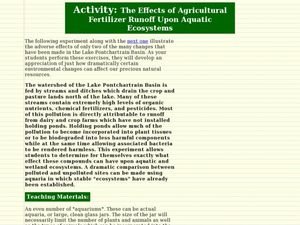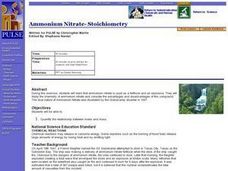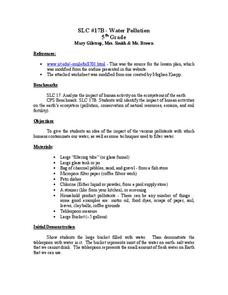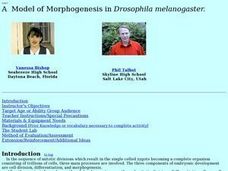Curated OER
Week 3: Pollution Source and Effects
Lab groups set up an experiment to observe what happens over time in collected pond water when fertilizer, representing pollution, is added. This website does not include student lab sheets, but background information, materials, and...
Curated OER
Is Our Water Healthy?
Students test water for a least one chemical characteristic. They hypothesize how a storm event might change the chemical characteristics of a stream. Students collect water samples and use the chemical test to test the water.
Curated OER
The Effects of Agricultural Fertilizer Runoff Upon Aquatic Ecosystems
Students measure the toxic levels of runoff and discuss the effects it would have on the aquatic system. In this runoff lesson plan, students answer questions to how runoff would affect the animals in an aquatic system.
Curated OER
WHAT'S ORGANIC?
Learners explore how certain foods come to be certified "organic." They write the words "organic" and "synthetic" and given the definitions of each. Students are given dictionaries. They are asked: "What is organic food?" Learners grow...
Curated OER
How about a Little Give and Take?
Middle schoolers design a closed system to test the relationships between plants and animals. They monitor abiotic fluctuations within this living system by using a chemical test kit. They observe how living organisms respond to...
Curated OER
Auxin: Indole-3-Acetic Acid
Students identify auxins from their structural formulas. They understand the process of refluxing in chemical synthesis. Students perform thin layer chromatography using silica gel plates to differentiate chemical substances.
Curated OER
The Effects of Alcohol and other Teratogens: A model using Zebrafish
Young scholars investigate the interference of various drugs on an embryo through experimentation. This is an open-ended lab to allow students to see effects of various chemicals humans choose to put in their bodies and create...
Nuffield Foundation
Observing Earthworm Locomotion
One acre of land can contain more than a million earthworms. Scholars collect earthworms to observe their movements. Once placed on paper, the sound of movement often fascinates pupils. When placed on glass, the earthworm is unable to...
Curated OER
Ammonium Nitrate - Heat of Solution
Students quantify the relationship between temperature, energy and heat
and define an endothermic reaction. They measure the energy change caused by dissolving one mole of ammonium nitrate in water.
Curated OER
What are Some Substances That Will Cause Algae To Grow?
Students discover algae. For this science lesson plan, students examine what green algae is and where it grows. Students determine the effects of oil, detergent, copper crystals sulfate and lawn fertilizer have on the growth of algae.
Curated OER
Are Seeds in Danger?
Eighth graders discuss uses and disposal of common household chemicals. They select a household chemical to test for impact on plant germination. Students decide how they want to set up a seed germination project. They design their plan,...
Curated OER
Ammonium Nitrate - Jeckyl or Hyde
Learners study how chemicals can be very dangerous when not treated with care. They watch Ammonium Nitrate power point and read about accidents involving ammonium nitrate: Halifax Explosion, Oklahoma City Bombing.
Curated OER
Ammonium Nitrate- Stoichiometry
Students quantify the relationship between moles and mass. They comprehend that ammonium nitrate is used as a fertilizer and an explosive. Students study the chemistry of ammonium nitrate and consider the advantages and disadvantages of...
Curated OER
Composting
Students discover the concept of decomposition. They examine how it makes the soil more fertile and how it helps plants. They put a compost bin in their backyard and record their observations.
Curated OER
Water Pollution
Fifth graders observe and record what happens when household products are added to a tank of water to depict water pollution. They brainstorm ideas of how to clean the contaminate out of the water before watching demonstrations of...
Curated OER
Water Pollution
Fifth graders investigate how humans pollute the water supply with a number of different contaminates. While working in small groups they examine screening, sedimentation, filtration, and chemical treatments as methods of water treatment.
Curated OER
Investigate Factors Affecting Nitrates in Groundwater
Learners participate in an experiment in which they investigate the factors affecting the levels of nitrates in groundwater. Using examples, they explain the nitrogen cycle and identify the sources of chemical nitrogen fertilizers. ...
Curated OER
Project Wetlands
Learners develop a joint undertaking designed to solve an environmental problem in their local community. They tackle the problem of erosion of banks and chemical run-off into a nearby lake, which is within walking distance of school.
Curated OER
Determination of Phosphates
Young scholars engage in a laboratory lesson in order to increase understanding of the impact of phosphates at the chemical and ecological levels. The lab exercise is completed with the goal of getting them to predict the outcomes and...
Curated OER
A Model of Morphogenesis in Drosophila Melanogaster
Students investigate the following scientific terms and ideas: rates of diffusion, the role of morphogens in the development of larva, the chemical dynamics of a cell, and the significance of embryo polarity during development.
Curated OER
Water Pollution
Fifth graders examine what contaminated water looks like, and how it becomes polluted. They examine a teacher demonstration of water is not polluted but does contain rocks and other things that do need to be cleaned out before drinking...
Curated OER
Midnight Dumpers
Students explain how pollution affects ground water. They participate in a simulation to discover the location of an illegal dump. Students explore the monetary benefits, risk and environmental concerns are factors in business decisions.
United Nations
Compost Monitor Training
What should go in the trash, and what can be composted? Guide your young conservationists through the process of composing their trash with a activity about the different ways we can dispose of garbage. Using a trash bag with clean...
SF Environment
Pre-School Composting and Recycling!
You can never be too young to get involved in composting or recycling. Here is a lesson that has been made for the very littlest learners and it's all about the importance of conservation. They'll sort compostable and recyclable objects,...

























